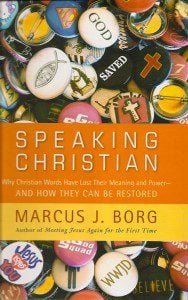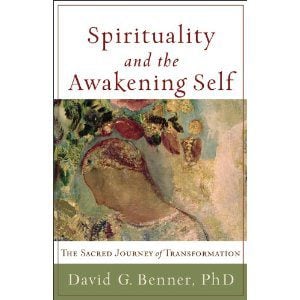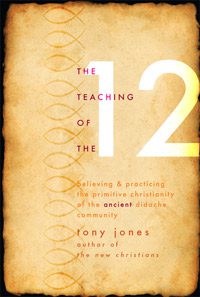The introductory post to this blog series is available here.
The highlights from Bass’ first two lectures are available here and here.
Borg’s first lecture is here.
My musings on the lectures are in brackets.
Borg’s second lecture was titled, “Case Study: Salvation (and its siblings: ‘Saved’ and ‘Savior’).”
- Many people have a primarily negative association with the word “salvation.” For many people “salvation” connotes less good news, hope, and joy and more the anxiety, fear, and threat of hell.
- In the Bible, however, salvation is often not about the afterlife. For example, the concern of the Hebrew slaves was not needing their sins forgiven, not about the afterlife. The salvation a slave needs is liberation from slavery to the powers that be, and “liberation” is precisely the meaning of salvation in the Exodus story: liberation right here, right now, and in this world –– not forgiveness or assurance of an afterlife.
- Similarly, when in the Jewish people were exiled in Babylon, the salvation an exile needs is homecoming right here, right now, and in this world — not forgiveness or assurance of an afterlife.
- Salvation is about transformation in this life: the transformation of ourselves and the world, both personal and political, individuals and society — see the Jewish conception of tikkun olam (“to heal, repair, and transform the world”).
- We all have an internal Pharaoh (“superego”). If you don’t have one, you are either a sociopath or a saint. For more, see the work of Walter Brueggemann (arguably the best living Christian scholar of the Hebrew Bbile scholar) such as his books The Prophetic Imagination (2nd Edition) or Disruptive Grace: Reflections on God, Scripture, and the Church.
- “Salvation” is about moving from sickness and woundedness to healing and wholeness” (root: salve). In the spirit of Henri Nouwen, being saved is about the transformation from being a “wounded wounder” to being a “Wounded Healer.”
- Salvation is about moving from blindness to seeing, which is less about literal restoration of sight, and more a metaphor for enlightenment.
- Salvation is about a reorientation from narcissistic self-preoccupation to becoming fully present and compassionate to all (including yourself).
- Matthew’s phrase ‘kingdom of heaven’ is merely a reverential circumlocution for the more common phrase ‘kingdom of God’ to avoid saying the word “God” — as, for example, many Jews write the word God as G-d out of respect for the holiness and mystery of God’s name.
- In Mark 1:15 (the earliest canonical Gospel), the “Kingdom of God” is not about Jesus’ death. Jesus didn’t come to die. Instead, Jesus was was killed because of how he lived (similar to why and how figures such as Oscar Romero, Martin Luther King, Jr., Gandhi, and Yitzhak Rabin were martyred in the twentieth-century). The consensus of New Testament scholars for decades has been that the kingdom of God (or “dream of God”) is central to Jesus’ life and teaching. And God’s dream is for this world to be characterized by justice and peace, just as the Hebrew prophets desired. [For more, see Walter Wink’s book The Powers That Be: Theology for a New Millennium.] On the “kingdom of God” as “God’s dream,” see Verna J. Dozier’s 1991 book The Dream of God: A Call to Return. More recently, Archbishop Desmond Tutu has write an adult book (God Has a Dream: A Vision of Hope for Our Time) and a children’s book (God’s Dream) on these themes.
For more details about each of these bullet points (and to judge for yourself in regard to these arguments), see Borg’s latest book Why Christian Words Have Lost their Meaning and Power and How They Can Be Restored (2011):
Stay tuned for the next installment on the highlights of Bass’ third and final lecture in the series.
The Rev. Carl Gregg is a trained spiritual director, a D.Min. candidate, and the pastor of Broadview Church in Chesapeake Beach, Maryland. Follow him on Facebook (facebook.com/carlgregg) and Twitter (@carlgregg).













